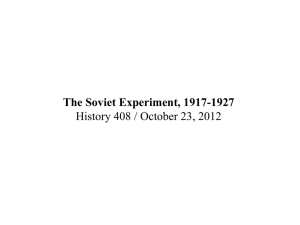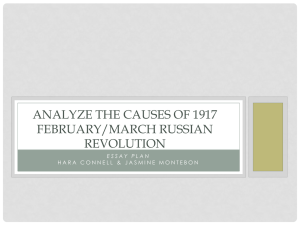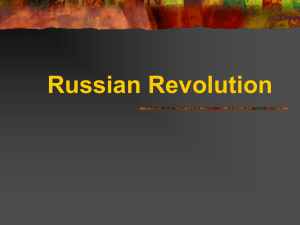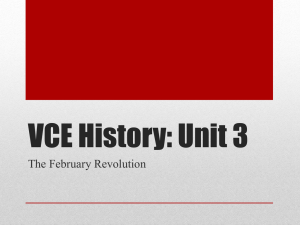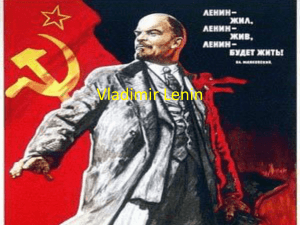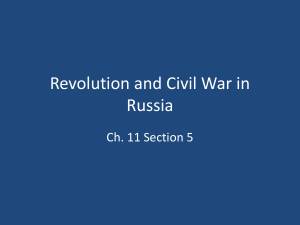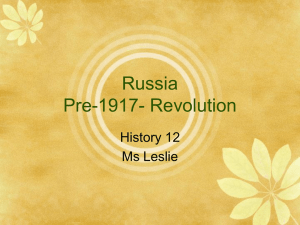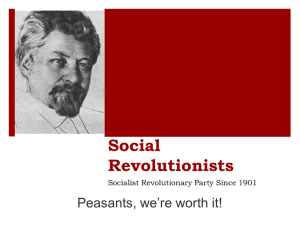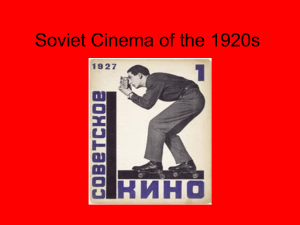Where to in Unit 3 outcome 1 Russia?
advertisement
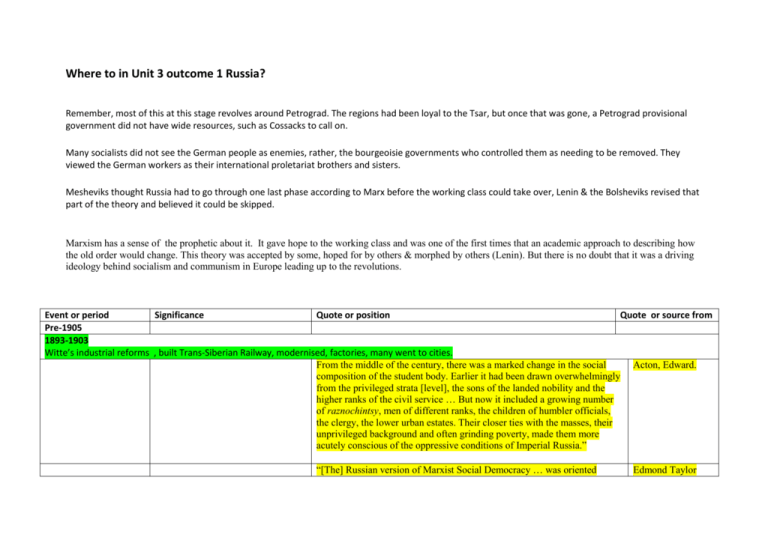
Where to in Unit 3 outcome 1 Russia? Remember, most of this at this stage revolves around Petrograd. The regions had been loyal to the Tsar, but once that was gone, a Petrograd provisional government did not have wide resources, such as Cossacks to call on. Many socialists did not see the German people as enemies, rather, the bourgeoisie governments who controlled them as needing to be removed. They viewed the German workers as their international proletariat brothers and sisters. Mesheviks thought Russia had to go through one last phase according to Marx before the working class could take over, Lenin & the Bolsheviks revised that part of the theory and believed it could be skipped. Marxism has a sense of the prophetic about it. It gave hope to the working class and was one of the first times that an academic approach to describing how the old order would change. This theory was accepted by some, hoped for by others & morphed by others (Lenin). But there is no doubt that it was a driving ideology behind socialism and communism in Europe leading up to the revolutions. Event or period Significance Quote or position Quote or source from Pre-1905 1893-1903 Witte’s industrial reforms , built Trans-Siberian Railway, modernised, factories, many went to cities. From the middle of the century, there was a marked change in the social Acton, Edward. composition of the student body. Earlier it had been drawn overwhelmingly from the privileged strata [level], the sons of the landed nobility and the higher ranks of the civil service … But now it included a growing number of raznochintsy, men of different ranks, the children of humbler officials, the clergy, the lower urban estates. Their closer ties with the masses, their unprivileged background and often grinding poverty, made them more acutely conscious of the oppressive conditions of Imperial Russia.” “[The] Russian version of Marxist Social Democracy … was oriented Edmond Taylor towards the industrial workers of the big cities rather than towards the miserable and restive peasantry that was the chief concern of the traditional Russian revolutionaries, 1903 (Lenin is in exile) Autocracy may suit an African tribe, but not the Russian people who are increasingly assimilating the culture of the rest of the world. The true founder of the new Social Democratic Party, though, was Lenin. He came from a respectable family of the bureaucratic nobility. The execution of his brother for attempting to assassinate the Tsar made 1887 a turning point. Tolstoy After … 1900, Lenin soon went abroad to carry on the struggle for what he considered the correct interpretation of Marxism. He brought to the socialist a hitherto rare hardness in discussion. He could be scurrilous about his opponents. He would not compromise, would not admit that his ideological enemies might be partly right. His friends, like Martov, were only friends so long as their views coincided. And yet, although politics Lenin seemed devious and unpleasant, there were many who found him an enjoyable companion in private.” Westwood, J. N. “It is necessary to prepare men who devote to the Revolution, not only their free evenings, but their entire lives.” “What is to be done”, book by Lenin Miller, Stuart. 1904-05 Russo-Japanese War The conflict was prompted by “domestic and foreign policy considerations” Russo-Japanese war “excited the social unrest that it had been specifically designed to dampen.” “The Japanese are infidels. The might of holy Russia will crush them.” (Historians Bucklow and Russel) Historian Lynch “The exiles abroad [in 1905] had by now begun to stir themselves at last. Lenin had been studying textbooks on street fighting in the Geneva libraries, and he sent a stream of instructions to his followers in Russia. Moorehead, Alan. Tsar Nicholas ll “I see with real horror,” he wrote, “that we have been talking bombs for more than half a year and not one single one was been made.” 1905-1914 (World War 1 beginning) Father Gapon leads petitioners to the (winter palace?) in Petrograd to make demands of the Tsar. 1905 “We working men of St Petesburg, our wives and children, our parents ... have come to you O Tsar, in quest of justice and protection. Father Gapon Bloody Sunday “gravely damaged the traditional image of the Tsar,” irrevocably altering him from “The Little Father” to “Nicholas the Bloody.” “Comrade workers, tear up all portraits of the blood-sucking Tsar.” The 1905 Revolution contributed to the 1917 Revolution by establishing workers ‘soviets through which “political agitation” could be effectively channelled by revolutionaries such as Lenin & Trotsky”. The Tsar was “out of touch” with Russian needs “Bread, Peace and Land” was Lenin’s slogan when he returned after 1905 Lynch 1905 Revolution. Strikes, mutinies, Tsarist forces shoot on the protestors St Petersburg Soviet formed October Manifesto made by the Tsar: Fundamental: Laws given. Sergei Witte made 1st Prime Minister Attempt by the Tsar, at Witte’s advice to satisfy demands for political reform with a kind of Constitution & a Duma. (The Tsars Fundamental “Not only fear and conscience, but God himself, commands obedience laws of 1906) to his authority.” Referring to his position in the new governmental Father Gapon Lynch Lynch Lenin The Tsars Fundamental laws of November 1906 structure and written at the start of the Fundamental Laws which were supposed to herald reform. “I will never trust that man (Witte) again. I had quite enough with last year’s experiment.” 1906) Tsar Nicholas ll 1906 1st Duma established and dismissed 1906 Stolypin made new Prime Minister The Dumas kept getting disbanded by the Tsar for trying to pass laws he didn’t like. Suppression first, and then, and only then, reform.” “The Tsar caught fright, issued a manifest: Liberty for the dead, for the rest – arrest.” “We have been given a constitution, but absolutism remains.” Pytor Stolypin 1906 popular song Leon Trotsky 1907 2nd Duma elected & dismissed & Trotsky exiled to Siberia 1907-1912 Third Duma 1912 – 1217 Fourth Duma “An era of counter-revolution has begun; and it will last some twenty years, unless in the meantime tsardom is shaken by a major war.” 1914: Germany declared war on Russia.St Petersburg renamed Petrograd. “The years since 1905 had not been prosperous for any of the Social 1914-February 1917 (1st Democrat factions, even though on the eve of the 1917 revolution) WW1 war there had been signs of a recovery. Membership had fallen started with patriotic drastically,... The outbreak of war further damaged the Bolshevik cause, fervour and worked at least in the first year. Holding true to their earlier promise not to initially in the Tsars support imperialist wars, the Bolsheviks found themselves opposing the favour. Russian war effort in a period of hysterical patriotism.” Disastrous casualty rates amongst soldiers (85% according to Historian Knox), combined with incapable organisation and leadership led to Lenin J. Westwood. Marcombe and Fielding (Historians) “military adhesion to revolutionary ranks.” Economic crises erupted as men and resources were drawn into the war effort. “Citizens were receiving one third of their bread and fuel requirements’.” Historian McDonald Tsar took control of the battle front 1915 August 1915 Nicholas ll’s decision to take command of the war front from the experienced General Nikolaevich “tied the fate of the Romanov Dynasty to the success or otherwise of Russia’s armies” Nicholas left Tsarina in charge of political affairs. Her inexperience resulted in four different Prime Ministers, five ministers of the interior and three foreign ministers. In addition her German ancestry angered the masses and the scandalous Rasputin failed to ameliorate the situation. By 1917 Russia was tottering on the brink” & Drastic food and fuel shortages .. and substantial unemployment “combined to produce a potentially explosive situation.” High death toll and desertion rates were due to bad leadership. “Be more autocratic than Peter the Great and sterner than Ivan the Terrible.” “We must pass on a strong country to baby.” “Don’t let things slip through your fingers.” “How I wish I could pour my will into your veins.” “I pity the Tsar. I pity Russia. He is poor and unhappy and lacks the will to govern.” “I have no rifles, no shells, no boots” “I like to talk with him (Rasputin), and invariably feel at peace with myself afterwards.” “Oh how terrible an autocracy is without an autocrat! The Tsar offends the nation by what he allows to go on at the palace.” “The people will interpret your move as one inspired by the Germans around you ...treason to the Russian cause.” “Better one Rasputin than ten fits of hysterics every day.” Lynch (Historian) Unsure Historians Bucklow and Russel) Lynch Tsarina Alexandra writing to the Tsar. Tsarina Alexandra writing to the Tsar. Count Serei Witte Grand Duke Nikolai Nicholas ii Vasili Shulgin Rodzianko Nicholas ii “The government enjoys the confidence neither of the Sovreign, the army, the towns, the Zemstvos, Nobility, merchants, nor working men. Such a government cannot perform its duties or even exist.” Prince Shcerbatov “That fat Rodzianko has again sent me some nonsense to which I will not even reply.” “This is a hooligan movement. Young people run around and shout there is no bread, to create excitement. This will al pass if the Duma will behave itself.” Nicholas ll February 1917 – October Revolution 1917 February Revolution 1917: Massive strikes and protests in Petrograd Provisional Government formed Feb 1917 Tsar Nicolas Abdicates March 1917 & the Grand Duke Mikhail also abdicated ending the Romanov Dynasty Provisional Government takes over and is too weak to keep control. “The old regime has left everything in chaos.” March 1917 Soviet Order no.1 Tsarina Alexandra Alexandr Kerensky The orders of the military commission of the state Duma are to be Soviet Order No. 1 obeyed only in such instances when they do not contradict the orders and decrees of the Soviet.” “The Soviets had power without authority ... the Provisional Alexandr Kerensky Government authority without power. Lenin returned from exile in Switzerland and wrote down the April Thesis and issued it. ( 4th April 1917) In this he asserts that there must be no working Lenin in his April Thesis. together between the Provisional Government and the Petrograd Soviet. “We do not claim that Marx knew or Marxists know the Lenin road to socialism down to the last detail. “It is obscene to applaud such rubbish. These are the ravings of a lunatic.” Bogdanov Trotsky returns to Petrograd in May 1917 The Provisional Government has June push to go back to the war July 9th, 1917 “Bread, Peace and all power to the Soviets.” “Our Tactics: absolute distrust, no support for the Provisional Government.” “We are not doctrinaires. Our theory is a guide to action, not a dogma.” “The Soviet of Workers’ and Soldiers Deputies .. enjoys all the elements of real power, since the troops, the railways, the post and telegraph are in its hands. One can say flatly that the Provisional Government exists only so long as it is permitted by the Soviet.” “Turning the present imperialist war into a civil war is the only correct proletarian slogan.” Lenin Lenin The Provisional Government’s continuation of the war “destroyed its own chances of survival.” The only way to save the country now is to close down the Soviet and shoot the people. I cannot do that but Kerensky can.” Provisional government had problems because of increasing numbers of members in the soviet & Lenin’s tactics. Lynch The Kornilov affair of August 1917 further showed weak leadership and allowed the Bolsheviks’ to be hailed as heros. Released from jail armed etc. Lynch Lenin Guchkov (The provisional Government Minister or War) Lenin Prince L’vov Lynch “We summon you to a social revolution. We appeal to you not to die for Lenin others but to destroy others, to destroy your enemies on the home front.” 23/October, 1917 November 6th 1917 “The epitome of all that was most dogmatic, authoritarian and amoral … was Lenin. His ‘deepest motive was the drive for personal power’, and he worked tirelessly to concentrate control of the party into his own hands. To achieve this end, he readily subjected the Social Democrats to ceaseless strife. Time and again he split the party, Edward Acton “I want to take the middle road but no one will help me.” “There is no middle road.” “Kerensky is on the offensive.” History will not forgive us if we do not seize power now. We seize power on behalf of the Soviets No revolution ever waits for a formal majority All power to the Soviets! Kerensky Lenin Trotsky Lenin “What has happened is an insurrection not a conspiracy. We hardened the revolutionary energy of the Petersburg workers and soldiers. We openly forged the will of the masses to insurrection and not conspiracy. You tell us to renounce our victory. You are miserable bankrupts, your role is played out; go back where you ought to: into the dustbin of history.” The events that led to the overthrow of the Provisional Government were not spontaneous but carefully plotted and staged by a tightly organised conspiracy... October was a coup d’état, the capture of governmental authority by a small band, carried out, in deference to the democratic professions of the age. Trotsky “The entire labour of practical organisation was placed under the immediate direction of the President of the Petrograd Soviet, Comrade Stalin Richard Pipes Richard Pipes th November 6 1917 Trotsky.” It can be stated with certainly that the party owes the rapid coming over of the garrison into the camp of the soviets and the skilful work of the Revolutionary Military Commitee above all, and essentially to Comrade Trotsky.” Stalin Other Political forces and voices in Russia that wanted some sort of change. (Note, most were intellectuals who were behind them) “Populism dated from the 1870s. It was a revolutionary movement, which regarded the future of Russia was being in the hands of the peasants who made up the overwhelming mass of the population. The Populists, or Narodniks (from the Russian word for ‘the people’) looked to the peasants to take the lead in transforming Russia, “The Cadets were semi-revolutionary and non-socialist: they wanted a democracy and a parliament along British lines, and as a means of forcing the Tsar to grant a constitution they gave their support to the strike. From now onwards the Cadets became one of the three main parties dominating the political scene. They stand well to the right of the Marxist Social Democrats (now divided into Bolsheviks and Mensheviks) and the Social Revolutionary Party, the party of the peasants – but for the moment their main opponent is the Tsar.” (p.65) Moorehead, Alan. The Russian Revolution, London: Collins, 1958 “The Kadet Party also came into being at the time of the 1905 Revolution. The title Kadets was a shortened form of Constitutional Democrats. They were also known as the ‘the Party of the People’s Freedom’. This was the liberal group with the largest following. The Kadets wanted Russia to develop as a constitutional monarchy, in which the powers of the Tsar would be restricted by a democratically-elected constituent (national) assembly … Among the other wide-sweeping reforms demanded by the Kadets in 1905 were full equality and civil rights for all citizens, the end of censorship, the abolition of redemption payments on land, the recognition of trade unions and the right to strike, and the introduction of universal, free education. The Kadets were the party of the liberal intelligentsia [thinkers] containing progressive landlords, the smaller … entrepreneurs, and members of the professions … [they] became the major opposition voice in the first Duma and were instrumental in forming the Provisional Government following the February Revolution in 1917.” (pp.44-5) Lynch, Michael. Reaction and Revolutions: Russia 1881-1924, London: Hodder & Stoughton, 1992 “[The Octobrists] dated from the issuing of the tsar’s manifesto of October 1905, which established the Duma. The Octobrists were moderates who were basically loyal to the tsar and his government. They believed in the maintenance of the Russian Empire and regarded the manifesto and the establishment of the Duma as going far enough in the direction of constitutional reform. The Octobrists were mainly drawn from the larger commercial, industrial and landowning interests.” (p.44) Lynch, Michael. Reaction and Revolutions: Russia 1881-1924, London: Hodder & Stoughton, 1992 The Soviets “A Petrograd Soviet of Workers’ Deputies … was set up by socialist intellectuals … The Soviet operated very informally, yet it had great power, even though it did not demand responsibility. In the Petrograd area it could determine which industrial work should continue and which should be strike-bound. Its soldier-members could to a large extent approve or veto the use of armed force. Without the approval of the Soviet the trains might not run, electricity and other services could not continue. Yet it did not pretend to be the government. It was the Duma leaders who began to fulfil that function…” (p.225) Westwood, J. N.Explore Lenin & Trotskys relationship. Who was the power house? Both I think. Use QAT SAC as our actual. Then double of feedback & preparation for final good copy.
